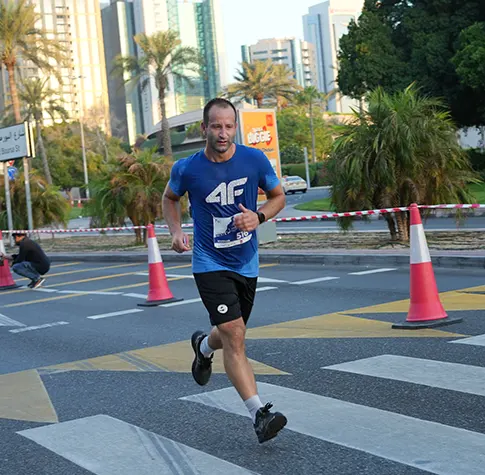How to Train for Your First 5K, 10K, 15K, or Half Marathon
Posted: 19 July 2025
Running your first race-whether it’s a 5K, 10K, 15K or half marathon-is more than just a physical challenge. It’s a journey that shapes your mindset, builds mental toughness, and strengthens your discipline. At Promoseven Sports Marketing, we’re passionate about helping every runner-beginner or advanced-reach their goals through structured, safe, and inspiring preparation.
This guide walks you through the essential strategies to train for your first race and cross the finish line confidently.
Why Running a Race Is a Life-Changing Experience
Taking on your first race is empowering. It brings structure to your workouts, boosts your mental health, and introduces you to a thriving running community. It also:
- Sets a tangible goal to work toward
- Improves cardiovascular health and endurance
- Instills daily discipline
- Introduces mindfulness and stress relief through running
- Connects you with local and global fitness communities
Whether you’re chasing your first 5K or eyeing the Plus500 City Half Marathon in Dubai, the right training will turn this goal into reality.

Choosing the Right Race: 5K, 10K 15K, or Half Marathon
Each race distance offers a different challenge. Your choice depends on your current fitness level, lifestyle, and training availability.
5K
- Best for beginners or casual runners.
- Manageable with 4-6 weeks of training.
- Perfect stepping stone into competitive or long-distance running.
10K
- Great for intermediate runners or those with basic endurance.
- Requires 6-10 weeks of preparation.
- Ideal for testing speed and stamina.
15K
- Perfect for experienced runners ready to push their limits.
- Requires 8–12 weeks of structured training.
- Bridges the gap between 10K and Half Marathon – ideal for building endurance and pacing skills.
Half Marathon
- Demands endurance, consistency, and planning.
- Suitable for runners with at least 4-6 months of regular running experience.
The 6 Pillars of Smart Race Training
Regardless of your race distance, your success depends on mastering these six core principles:
1. Progressive Overload
Start small and gradually increase intensity. Follow the 10% rule: never increase weekly mileage by more than 10% to avoid injury.
2. Consistent Running Schedule
Train at least 3 days per week. Maintain a balance between easy runs, long runs, and speed workouts.
3. Long Runs
The backbone of any training program. Add a long run each week to build stamina, but keep the pace slow and steady.
4. Cross-Training
Incorporate activities like swimming, cycling, or strength training 1-2 times a week to improve overall fitness.
5. Strength & Mobility Work
A strong body handles mileage better. Focus on glutes, hamstrings, core, and calves. Include foam rolling and stretching to prevent stiffness.
6. Rest & Recovery
Muscles rebuild when you rest. Prioritize 1-2 rest days each week and sleep at least 7-8 hours per night.

Nutrition & Hydration Strategy
What you eat and drink can dramatically affect your training outcomes and race day performance.
Pre-Run Fuel
- Light meals 1-2 hours before: banana with peanut butter, oatmeal, toast with eggs.
- Avoid high-fat, heavy foods that slow digestion.
During the Run
- Under 45 minutes: water is enough.
- Over 60 minutes: include electrolyte drinks, sports gels, or chews every 30 minutes.
Post-Run Recovery
- Eat within 30 minutes: mix protein and carbs (e.g., Greek yogurt with fruit, protein smoothie).
- Hydrate to replenish lost fluids.
Race Day Readiness
Preparation goes beyond running. Here’s what to focus on in the final days:
The Week Before
- Reduce training volume (taper).
- Prioritize sleep and hydration.
- Eat familiar, carb-rich foods—nothing new.
The Night Before
- Lay out your gear: bib, timing chip, clothes, socks, watch, hydration belt.
- Pack fuel (if needed) and plan your route to the start line.
- Sleep early, even if you’re nervous.
Race Morning
- Eat 2–3 hours before the race.
- Do a 5–10 min warm-up jog and dynamic stretches.
- Get to the start line early to avoid stress.

Mental Training for Race Day
Running isn’t just physical-it’s 80% mental, especially in the final miles. Practice these strategies:
- Mantra repetition: “I’m strong,” “One step at a time,” “I can do this.”
- Break down the race: Mentally split it into 1K or mile segments.
- Visualize success: Picture yourself crossing the finish line proud and strong.
- Embrace discomfort: Know that it’s temporary and part of progress.
Avoiding Common Training Mistakes
- Overtraining
- More is not always better. Balance running with recovery.
- Skipping Warm-ups
- Cold muscles are prone to injury. Begin each session with a light jog or dynamic moves.
- Ignoring Pain
- Don’t run through sharp or persistent pain. Early intervention prevents long-term issues.
- Wearing the Wrong Shoes
- Always run in proper footwear suited to your gait and arch. Replace shoes every 500–800 km.
Gear Recommendations for New Runners
Invest in the essentials:
- Running Shoes: Visit a running store for gait analysis.
- Technical Running Gear: Moisture-wicking clothes, running socks.
- Hydration Tools: Handheld bottles, waist belts, or hydration packs.
- Sports Watch or App: Track distance, pace, and progress (e.g., Strava, Garmin, Nike Run Club).
- Foam Roller: Aid post-run recovery and reduce muscle tightness.

Why Sign Up with Promoseven Sports?
Promoseven Sports delivers professional, community-driven race experiences across the UAE and beyond. When you register for a race like the Plus500 City Half Marathon Dubai, you benefit from:
- Scenic and accurately measured courses
- On-course water and aid stations
- Energetic crowd support
- Organized race day logistics
- Finisher medals and professional timing
- A motivating, inclusive running community
It’s not just a race-it’s a celebration of movement, determination, and achievement.
Looking Ahead: What Comes After Your First Race?
The race doesn’t mark the end-it marks the beginning of your journey as a runner. After you cross the finish line:
- Reflect on what went well and what you’d improve.
- Celebrate your achievement–no matter the result.
- Recover properly-walk, stretch, and hydrate.
- Set a new goal-whether it’s a faster time, longer distance, or new location.
With the right mindset and community, running can become a lifelong passion.
Join the Movement
Are you ready to challenge yourself and become part of something greater?
The Plus500 City Half Marathon is taking place in Dubai on November 16, 2025. Whether you’re targeting the 5K, 10K, 15K or Half Marathon, it’s the perfect place to debut your training.
At Promoseven Sports Marketing, we’re here to support your running journey-from the first step to the finish line and beyond.
JOIN THE CHALLENGE

November 16
Registration is open.
